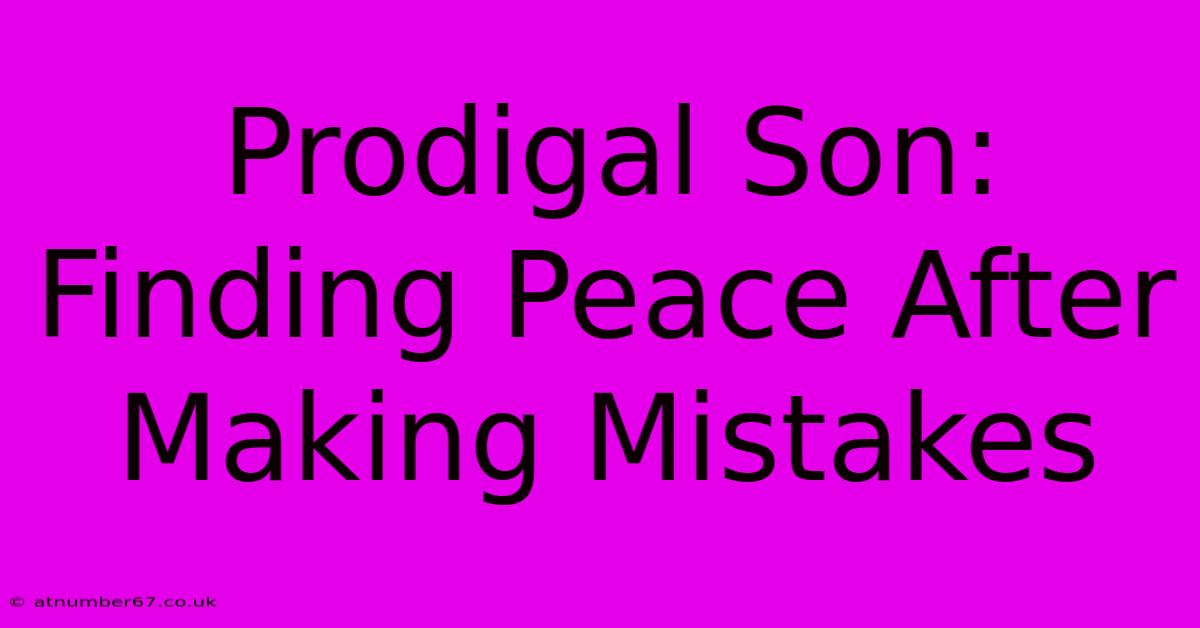Prodigal Son: Finding Peace After Making Mistakes

Table of Contents
Prodigal Son: Finding Peace After Making Mistakes
We all make mistakes. Some are small, easily rectified missteps. Others are larger, casting long shadows that seem to follow us for years. The biblical parable of the Prodigal Son resonates deeply because it speaks to this universal human experience: the pain of regret, the struggle for forgiveness, and the arduous journey back to peace. This isn't just a religious story; it's a powerful metaphor for navigating the complexities of self-forgiveness and rebuilding our lives after significant errors in judgment.
Understanding the Weight of Regret
The Prodigal Son's story begins with a reckless abandonment of his family and inheritance. He squanders his resources, hits rock bottom, and is forced to confront the devastating consequences of his actions. This is a familiar feeling for many: the crushing weight of regret, the gnawing self-criticism, and the overwhelming sense of shame. Mistakes can leave deep wounds, impacting our self-esteem, relationships, and overall well-being.
The Stages of Repentance
The path to peace after making significant mistakes isn't linear. It often involves several stages:
- Acknowledgement: The first step is acknowledging the mistake. This can be incredibly difficult, requiring honesty with ourselves and a willingness to confront painful truths. Denial only prolongs the suffering.
- Responsibility: Taking responsibility for our actions, avoiding blame-shifting or making excuses, is crucial. This isn't about self-flagellation; it's about owning our part in the situation and understanding the impact our choices had on others.
- Remorse: Genuine remorse involves feeling genuine sorrow for the harm caused. This is different from simply feeling sorry for ourselves; it's about empathizing with those affected by our mistakes.
- Reparation: Wherever possible, making amends is a vital step. This might involve apologizing sincerely, offering restitution, or working to repair damaged relationships. This isn't always possible or easy, but the intent is essential.
- Forgiveness: This is arguably the most challenging part. Forgiving ourselves is often more difficult than forgiving others. It requires compassion, self-acceptance, and a recognition that we are all flawed human beings capable of making mistakes. Seeking professional help, such as therapy, can be invaluable during this stage.
Finding Your Way Back: Steps to Peace
The journey from regret to peace is a personal one. However, several strategies can aid in the process:
- Self-Compassion: Treat yourself with the same kindness and understanding you would offer a friend who made a similar mistake. Avoid self-criticism and focus on learning from the experience.
- Mindfulness: Practicing mindfulness can help you to become more aware of your thoughts and feelings, reducing the power of negative self-talk.
- Seeking Support: Talking to trusted friends, family members, or a therapist can provide invaluable support and perspective.
- Focusing on the Present: While acknowledging past mistakes is important, dwelling on them prevents you from moving forward. Concentrate on building a positive future.
- Setting New Goals: Setting and achieving new goals can help restore your sense of purpose and self-worth.
- Acts of Service: Helping others can shift your focus outwards and foster a sense of meaning and purpose.
Turning Mistakes into Opportunities:
The Prodigal Son's story doesn't end with his return home. He is welcomed back, not because he deserves it, but because of the grace and mercy extended to him. This highlights the possibility of redemption and the transformative power of forgiveness. Our mistakes don't define us; our response to them does. We can choose to learn from our errors, grow from our experiences, and build a more fulfilling life. The journey may be challenging, but the potential for peace and growth is immense. Embrace the opportunity to become a better version of yourself.
Keywords:
Prodigal Son, Finding Peace, Making Mistakes, Regret, Forgiveness, Self-Forgiveness, Redemption, Repentance, Healing, Recovery, Mental Health, Self-Compassion, Mindfulness, Therapy, Relationships, Amends, Personal Growth.

Thank you for visiting our website wich cover about Prodigal Son: Finding Peace After Making Mistakes. We hope the information provided has been useful to you. Feel free to contact us if you have any questions or need further assistance. See you next time and dont miss to bookmark.
Featured Posts
-
Baby Boomers Age Staying Relevant And Connected
Mar 31, 2025
-
Dustin Yus Age An In Depth Look
Mar 31, 2025
-
Harlem Eubanks Family The Fathers Role
Mar 31, 2025
-
Yuzvendra Chahals Net Worth From Humble Beginnings To Riches
Mar 31, 2025
-
Charles Leclerc His Net Worth And The Future Of Formula 1
Mar 31, 2025
